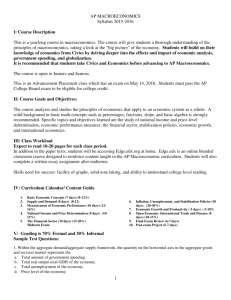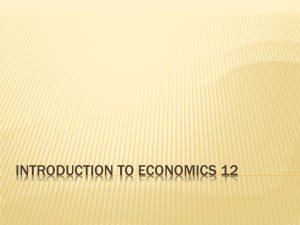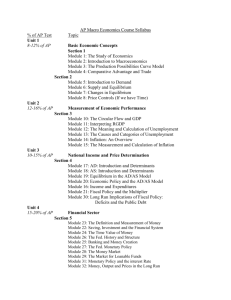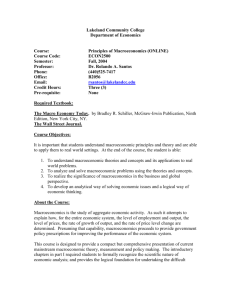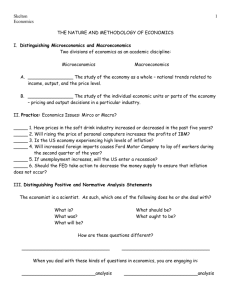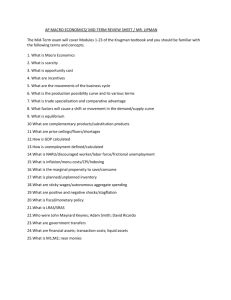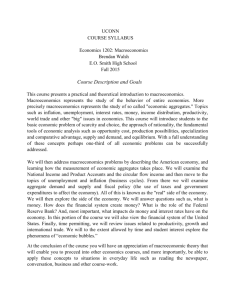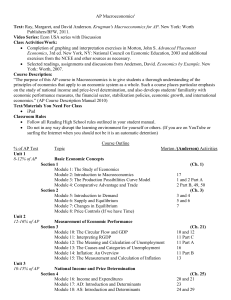Quizzes & Exercises 10% - IWS2.collin.edu
advertisement
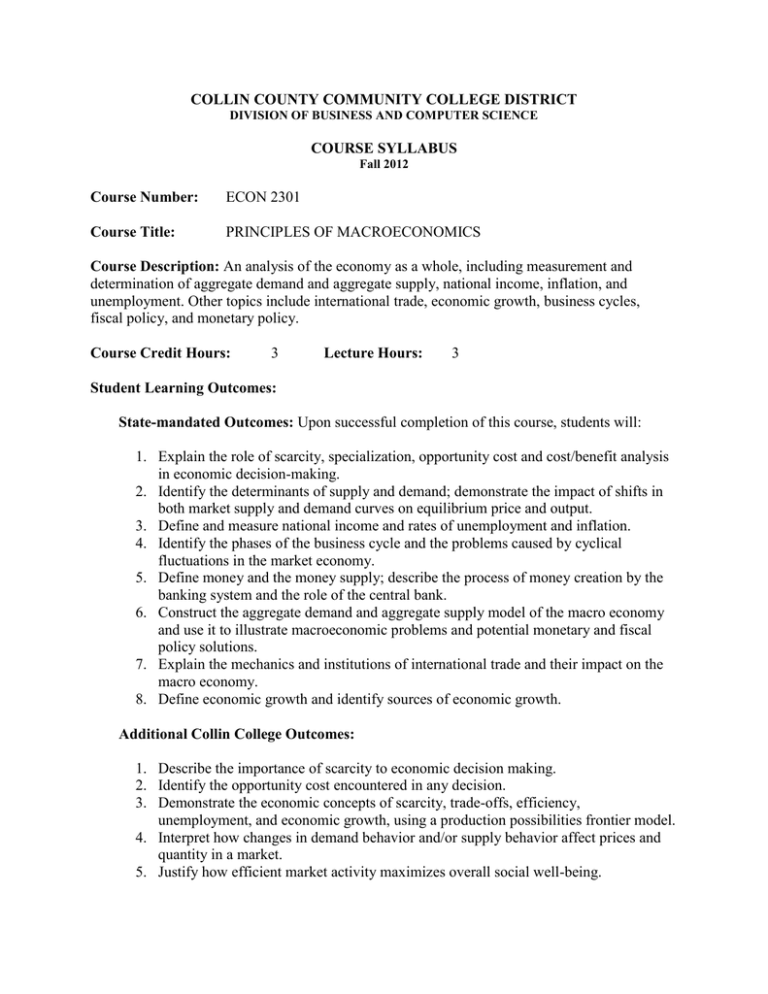
COLLIN COUNTY COMMUNITY COLLEGE DISTRICT DIVISION OF BUSINESS AND COMPUTER SCIENCE COURSE SYLLABUS Fall 2012 Course Number: ECON 2301 Course Title: PRINCIPLES OF MACROECONOMICS Course Description: An analysis of the economy as a whole, including measurement and determination of aggregate demand and aggregate supply, national income, inflation, and unemployment. Other topics include international trade, economic growth, business cycles, fiscal policy, and monetary policy. Course Credit Hours: 3 Lecture Hours: 3 Student Learning Outcomes: State-mandated Outcomes: Upon successful completion of this course, students will: 1. Explain the role of scarcity, specialization, opportunity cost and cost/benefit analysis in economic decision-making. 2. Identify the determinants of supply and demand; demonstrate the impact of shifts in both market supply and demand curves on equilibrium price and output. 3. Define and measure national income and rates of unemployment and inflation. 4. Identify the phases of the business cycle and the problems caused by cyclical fluctuations in the market economy. 5. Define money and the money supply; describe the process of money creation by the banking system and the role of the central bank. 6. Construct the aggregate demand and aggregate supply model of the macro economy and use it to illustrate macroeconomic problems and potential monetary and fiscal policy solutions. 7. Explain the mechanics and institutions of international trade and their impact on the macro economy. 8. Define economic growth and identify sources of economic growth. Additional Collin College Outcomes: 1. Describe the importance of scarcity to economic decision making. 2. Identify the opportunity cost encountered in any decision. 3. Demonstrate the economic concepts of scarcity, trade-offs, efficiency, unemployment, and economic growth, using a production possibilities frontier model. 4. Interpret how changes in demand behavior and/or supply behavior affect prices and quantity in a market. 5. Justify how efficient market activity maximizes overall social well-being. 6. Demonstrate the inefficiencies that develop in a market when government imposes a price control. 7. Describe how the following macroeconomic measurements are calculated: nominal gross domestic product, price index, and unemployment. 8. Given proper data, compute the following macroeconomic measures: inflation rate, real gross domestic product, unemployment rate. 9. Defend the logic of the full-employment goal. 10. Describe the components of the business cycle. 11. Construct the AD-AS model of the macro economy and use it to illustrate macroeconomic problems and potential solutions. 12. Outline the precepts of classical economics. 13. Describe how an economy could self-regulate to a full-employment state. (Communication Skills) 14. Analyze Keynes’ criticism of classical economics. (Critical Thinking) 15. Analyze Keynes’ role for government intervention into the economy. 16. Defend the use of deficit spending by the government in order to intervene in a recession. 17. Assess the problems of using excessive deficit spending by the government. 18. Justify the use of tax rate cuts to promote economic growth. 19. Describe fractional reserve banking as a means of controlling the size and growth of the money supply. 20. Compare and contrast the three tools that the Fed can use to control the money supply. 21. Relate a change in the money supply to a change in the inflation rate, a change in the economic growth rate, and a change in the interest rate. 22. Contrast the role of the Fed as espoused by activists and by non-activists. 23. Identify policies that promote economic growth. 24. Outline the impact of international trade on the macro economy and on macro policy decisions. 25. Assess the impact of globalization on international trade, investment, and the distribution of jobs. Withdrawal Policy: Students are advised to withdraw from the course if they have not completed the required work by the "Last Day to Withdraw." Students who do not complete all of the required work by the end of the course will receive a letter grade based on the work completed. There will be no grades of "incomplete" given. Note that the professor cannot withdraw you from class. You must complete a drop form with Admissions and Records to formally withdraw. The last day to withdraw this semester is October 19, 2012. Collin College Academic Policies: Any situation in which cheating or other unethical activity is suspected will be brought to the attention of the Dean of Students for adjudication and disposition. Do your own work. The penalty for scholastic dishonesty is normally a grade of zero on the work in question. See the current Collin Student Handbook for additional information. Religious Holy Days: please refer to the current Collin Student Handbook. Americans with Disabilities Act: Collin College will adhere to all applicable federal, state, and local laws, regulations, and guidelines with respect to providing reasonable accommodations as required to afford equal opportunity. It is the student’s responsibility to contact the ACCESS office, SCC-G200 or 972.881.5898 (V/TTD: 972.881.5950) to arrange for appropriate accommodations. See the current Collin Student Handbook for additional information. Instructor's Information: Professor: Tom Hudgins Office: Spring Creek Campus, Room G225 Office Hours: MW 10:00-1:00 Office Phone: 972-516-5060 E-mail: thudgins@collin.edu Class Information: ECON 2301.S08 ECON 2301.S09 ECON 2301.S10 TR 10:00-11:15 TR 11:30-12:45 TR 1:00-2:15 Room J209 Room J209 Room J209 Course Resources: Required textbook is O’Sullivan/Sheffrin/Perez, Economics: Principles, Applications, and Tools, 7th edition (with MyEconLab). Attendance Policy: You are expected to attend class and participate. Method of Evaluation: Your course grade will be based on the following: Exam 1 30% Exam 2 30% Exam 3 30% Quizzes & Exercises 10% TOTAL 100% Notes: (1) Exams will consist of definitions, multiple choice questions, and short essay questions. Specific dates for exams will be announced in advance, and a study guide will be provided. Students are expected to take the exams at the scheduled time. (2) Quizzes and exercises are short assignments to assess your knowledge of economic terms and concepts. They will either be given in class or they will be on MyEcon Lab. (3) Please notice that there is no "extra work" possible in this course. Do your best work the first time. Class Rules: (1) No children in class. (2) Food and drink may be consumed in class, but remove all remains. (3) Do NOT use cell phones, notebook computers, or other electronic devices in class. All cell phones MUST be turned off during exams and quizzes. (4) Please respect the right of others to speak and have opinions that might differ from yours. COURSE CALENDAR: WEEK 1: What is Economics and why is it important? Thoughts: Man produces in order to consume. --Frederic Bastiat Read: Chapter 1: Introduction: What is Economics? WEEK 2: What are the key principles of Economics? Thoughts: At all times and places that is dear which is difficult to come at, or which it costs much labour to acquire; and cheap which is to be had easily, or with very little labour. –Adam Smith Read: Chapter 2: The Key Principles of Economics WEEK 3: How does a market work? Thoughts: Economic Science is but the working of common sense aided by appliances of organized analysis and reasoning. --Alfred Marshall Read: Chapter 3: Exchange and Markets Chapter 4: Demand, Supply, and Market Equilibrium WEEK 4: How do we measure total economic activity? Thoughts: Maximum economic production does not lead necessarily to maximum economic satisfaction. --Sir Josiah Stamp Read: Chapter 5: Measuring a Nation’s Production and Output WEEK 5: What problems occur at the macroeconomic level? Thoughts: The rate of unemployment is 100 percent if it is you that is unemployed. --Anonymous Inflation might almost be called legal counterfeiting. --Irving Fisher Read: Chapter 6: Unemployment and Inflation EXAM 1 EXAM 1 EXAM 1 EXAM 1 WEEK 6: What are the characteristics of an Economy at full employment? Thoughts: The principle of laissez-faire may be safely trusted to, in some things, but in many more it is wholly inapplicable; and to appeal to it on all occasions savours more of the policy of a parrot than of a statesman or philosopher. --J. R. McCulloch Read: Chapter 7: The Economy at Full Employment WEEK 7: Why is growth important? Thoughts: Production not being the sole end of human existence, the term unproductive does not necessarily imply any stigma. --John Stuart Mill Read: Chapter 8: Why do Economies Grow? WEEK 8: What are the sources of economic instability? Thoughts: Political economy is not a body of natural laws in a true sense, or of universal and immutable truths, but an assemblage of speculations and doctrines which are the result of a particular history. --Thomas Leslie Read: Chapter 9: Aggregate Demand and Aggregate Supply WEEK 9: How can government affect total spending? Thoughts: Small debts are like small shot: they are rattling on every side, and can scarcely be escaped without a wound; great debts are like cannon: of loud noise, but little danger. --Samuel Johnson Read: Chapter 10: Fiscal Policy Chapter 11: The Income and Expenditure Model (Part) EXAM 2 EXAM 2 EXAM 2 EXAM 2 WEEK 10: Why are financial markets and financial intermediaries important? Thoughts: The study of money, above all fields in economics, is the one in which complexity is used to disguise truth or to evade truth, not to reveal it. --John K. Galbraith Read: Chapter 12: Investment and Financial Markets WEEK 11: How does government control the money supply and banking? Thoughts: The only quality demanded of a monetary system which is of any importance for promoting the trade and general welfare of the world, is stability. --Gustav Cassel Read: Chapter 13: Money and the Banking System WEEK 12: How do changes in the money supply affect the economy? Thoughts: There have been three great inventions since the beginning of time: fire, the wheel, and central banking. --Will Rogers Read: Chapter 14: The Federal Reserve and Monetary Policy WEEK 13: What do we understand about the dynamics of macroeconomics? Thoughts: Economics can no longer be left to the economists or sociologists. The study of complex interactive systems requires an interactive team: behavioral scientists, mathematicians, statisticians, psychologists, systems analysts, and numerical data handlers. --Maurice G. Kendall Read: Chapter 15: Modern Macroeconomics: From the Short Run to the Long Run Chapter 16: The Dynamics of Inflation and Unemployment WEEK 14: Is our understanding of macroeconomics complete? Thoughts: People and politicians are dominated by quite excessive expectations as to what can possibly, or practically, be delivered by governmental economic policies. --T. W. Hutchinson Read: Chapter 17: Macroeconomic Policy Debates WEEK 15: What are the effects of trade on the macroeconomy? Thoughts: Trade in its nature is free, finds its own channel, and best directeth its own course; and all laws to give it rules and directions, and to limit and circumscribe it, may serve the particular interests of private men, but are seldom advantageous to the public. --Charles D'Avenant Read: Chapter 19: Section 19.5, Managing Financial Crises EXAM 3 EXAM 3 EXAM 3 EXAM 3
